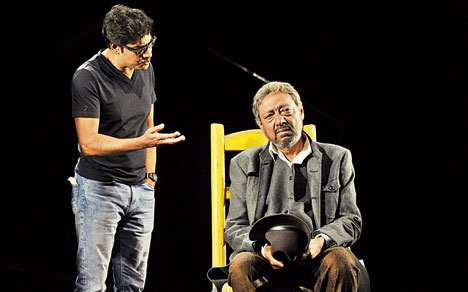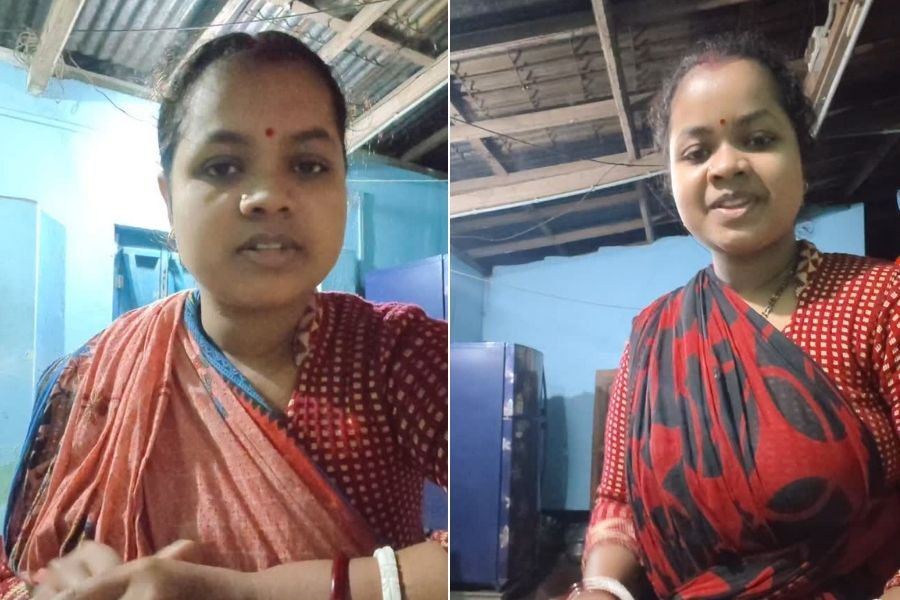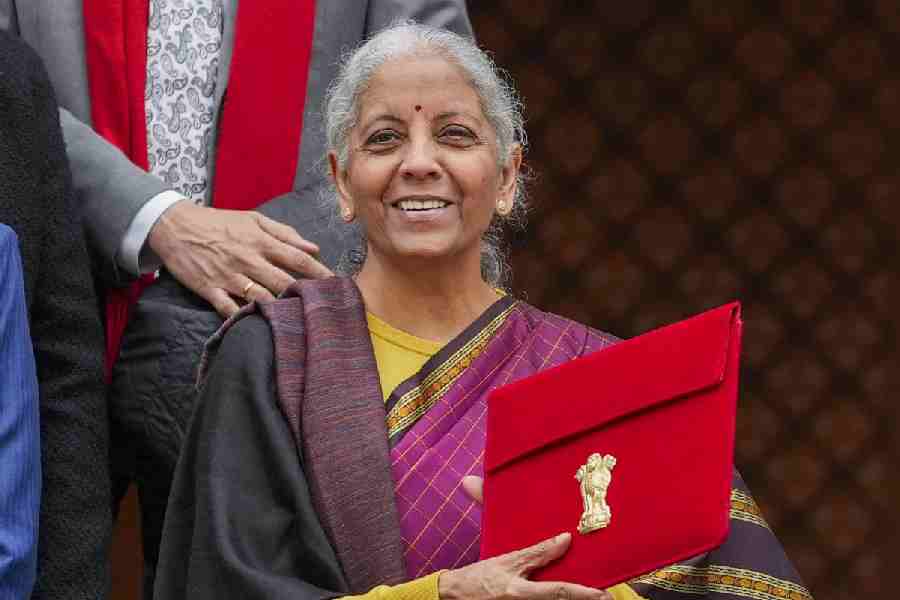
Amid rehearsals on in full swing at Gyan Manch for Koushik Sen’s latest play Taraye Taraye, Anjan Dutt shares the role Vincent van Gogh has played in his life and the need to create one’s own space...

Why did you say yes to the play?
When Koushik came to me with Vincent van Gogh’s story, I couldn’t say no because I think Van Gogh is one of the greatest characters one can wish to play.
I consider myself to be a small-time artiste, so to play an artist like Van Gogh is quite something. Vincent van Gogh has inspired so many of us to sing, to think differently, to live, to question, to be different. One of the persons who has been instrumental in my life to fight mediocrity has been Van Gogh. When you have someone you think is one of the most important persons in your life in terms of inspiration, and then you have to play that character suddenly at the age of 64 — that is coincidence, which is magical. So I immediately said yes to the play.
How is it to be directed by Koushik Sen?
I have been doing theatre for a long time but there are only two plays where I have been directed by someone else, which is Chanda Dutt. One was Ibsen’s Ghost and the other was Three Penny Opera.
Koushik is extremely passionate about theatre and he has written the play very passionately as well. He has an interesting way of directing because he knows what to tell me, what to tell Reshmi, what to tell Riddhi and what to tell somebody else. And all these are different. He has a way of dealing with each actor differently, which is very important for any piece of collaborative art. I have been given a certain freedom and also at the same time he knows how to restrict. He doesn’t direct technically, he directs emotionally.
How is it working with Riddhi?
I have earlier worked with him in a play called Galileo. We had spent time with each other. He is an extremely talented actor. But the most interesting experience this time is my experience with Reshmi. I really have not interacted with her very much before this play. I think she is fantastic. She has been a very, very interesting actor to work with. I look forward to working with her in my work.
Some people call you a maverick, some label you an eccentric. Where do you see yourself in terms of your creative energy?
I have always worked out of my own space. All my characters, all my cinema have been close to my life. I wrote songs about characters that I know and relate very personally. My locations are the ones I like — Darjeeling or north Calcutta… my work has always been very personal.
Vincent is a wild, mad person. In his personal life, when he was alive, he failed. He became a legend after his death. He was a misunderstood, mad person. That madness is celebrated here. And I find that wonderful because I personally have always considered myself to be a failed actor in the sense that when I really wanted to be an actor I couldn’t find enough roles and nobody cared for me. So there is that misunderstood actor in me which is helping me understand the pain of Vincent. Doing this character has given me the courage to face the label. Those who label me as a maverick or an erratic person, selfish, or whatever — today, at this age, I find Vincent has given me that courage and justification for not giving into mediocrity. Vincent tells me, ‘Don’t bother about labels, just be yourself’. The character of Vincent is giving me that courage… I relate to that pain, to that madness and I think what Koushik is trying to say is important in our time. In this age of utter mediocrity and its universal acceptance, we need to be a little mad. We need to be erratic. We need to be different.

Director’s note
What made you write this play?
Taraye Taraye has been inspired by Srijato’s novel, which doesn’t lend itself easily to a visual adaptation for stage. But I decided to take the risk because I thought what Srijato has tried to say in the novel is very important to me.
This play questions the state, the common man’s insecurities, it speaks not just about state-sponsored violence but also personal violence. If someone dares to dream, we either label him as mad, or call him a genius and put him on a pedestal, any which way the dreamer gets socially quarantined. But we desperately need such madness, such out-of-the-box vision to sustain humanity. This thought appealed to me and I wrote the play.
How is it to direct Anjan Dutt?
It is very inspiring to work with Anjanda. He is so passionate. There is a certain sadness, a melancholy in him. That has helped a lot in recreating the character of Van Gogh. It’s not easy to be rejected. And Van Gogh has faced rejection throughout his life. He had never sold a single painting in his lifetime. Anjanda can instinctively link with that headspace of Vincent van Gogh.
Rukhsar’s character seems to be a metaphorical representation of the common man who doesn’t want to be labelled mad but still has the pulse to feel that madness...
Absolutely! Rukhsar is constantly trying to say, ‘Come back to reality’. But by the end of the play, we see her gradually taking the same trip as those of Van Gogh and Ritwick.
Whenever there has been a state-sponsored oppression, you can feel it. But there is also an oppressor within us. We become the tools of oppression as we start resisting anything that does not fit our definition of truth and reality. We find it difficult to accept a different world view. We become intolerant.
However, this madness is infectious. If you are sensitive, you won’t be able to stay away from this
madness for a long time.
What: Taraye Taraye, a play by Koushik Sen
Where: Gyan Manch
When: May 29, 7pm; June 3, 10.30am
The play: Adapted from Srijato’s novel Tara Bhora Akasher Niche, Taraye Taraye is about the need for madness in a world of the so-called ‘normal’.
Ritwick, a guy with a good job, suddenly starts hallucinating. Concerned, his wife Sharmila brings him to Rukhsar Ahmed, a psychiatrist, who explores if Ritwick sees any particular vision repeatedly. He replies yes, the vision that gets repeated in his head is The Starry Night painting by Dutch artist Vincent van Gogh. We also get to hear the story of Van Gogh himself, especially the time while he was in the asylum, in a parallel narrative.
Ritwick’s situation worsens and we realise that there’s a similarity between him and Van Gogh. Neither are able to connect to their immediate surroundings, their life and times. People around both are treating them as mad. This madness is seen as a disease and it continues till we discover that this madness is infectious.
Finally, one day, Ritwick meets Van Gogh. How? Is this meeting a figment of his imagination? Are the others in Ritwick’s life, like his wife or the doctor, aware of this meeting? Is it at all imaginary or is there a reality to it? What is real, what is imagination and where lies the thin line between imagination and hallucination? Taraye Taraye explores all that and much more.
Duration: 1 hour 45 minutes, without interval
Language: Bengali
Direction and script: Koushik Sen
Cast: Anjan Dutt (plays Vincent van Gogh), Riddhi Sen (plays Ritwick as well as Theo), Reshmi Sen (plays psychiatrist Rukhsar Ahmed), Surangana Banerjee (plays Ritwick’s wife Sharmila), Koushik Sen (plays several roles including that of the narrator) and others.
Music: Neel Dutt
Set design: Sanchayan Ghosh
Light: Sudip Sanyal
Tickets: Priced Rs 100 and Rs 200, available at Academy of Fine Arts, online at www.swapnasandhani.com as well as at the venue (on the day of the show).

Neel Dutt on the music
Koushikda wanted me to do the music as per my reading of the script. I have tried to create a minimalist music for the play. Vincent van Gogh used to listen to post-Romantic music... Beethoven and Wagner. So I have used Beethoven. Then I composed some pieces according to the emotions that are in the story... a charango piece, a piece that reflects a certain timelessness. I am like a one-man band on stage. I am playing guitar and using my laptop to create sound. It’s a welcome break to do music for a play. It’s challenging as well.
Text: Sibendu Das
Pictures: Pabitra Das











